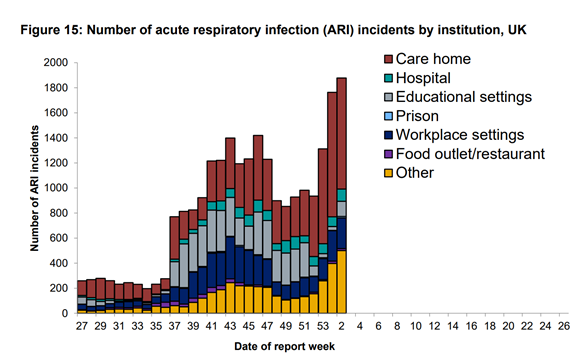Workplace Covid outbreaks are at an all-time high. Where is the action?
There is currently an all-time high number of Covid-19 outbreaks – which is when at least two people test positive for the virus. This suggests that some instances of Covid are being spread from person to person at work.
You might think that more work-related infections would mean more enforcement of workplace safety rules. But in 2020, significantly fewer inspections took place compared to previous years, and this week The Observer reported that just 0.1% of cases investigated by the Health and Safety Executive (HSE) resulted in any notices being served to the regulator.
Of those, not a single employer has been prosecuted.
Enforcement needs funding
The background to gaps in enforcement is a decade of austerity. Both the HSE and local authorities (the other main workplace safety regulator) have suffered huge funding cuts in the last ten years.
In 2009/10 the HSE received £231 million from the Government, and in 2019/20 it received just £123 million: a reduction of 46% in ten years.
Less funding means fewer inspections: over the same ten-year period, the number fell by 70%. As Prospect has said: “there are only 390 full-time equivalent inspectors for the whole of mainland UK. That is just not enough.”
The government did give the HSE a one-year cash injection to help respond to the pandemic, but this has not increased the number of inspectors, who are expensive to train.
A short-term grant clearly does not fix the chronic underfunding of the agency. Covid has exposed the need for effective enforcement: the government must reverse the cuts to HSE and local councils and provide every possible resource needed to keep workers safe.

Safety rules must be more strict
The problem is not just a lack of enforcement action, but with the safety rules being enforced in the first place. Existing ‘Covid-Secure’ guidance needs strengthening to prevent transmissions – especially now we know the new strain of the virus is up to 70% more contagious. That’s why the TUC called for action to toughen up advice to bosses at the start of the most recent lockdown.
Unions are also receiving many reports of employers refusing to allow people who can reasonably work from home to do so. This is unacceptable: we need a crackdown on these bad bosses.
In Wales, the government is forcing employers to re-do risk assessments on account of the new strain of Covid. In Scotland, bosses have been told clearly that working from home must be as it was in the first lockdown.
We need the UK government to follow suit.
Where work remains open, union safety reps must be negotiating the most stringent of safety controls. That means two-metre distancing, appropriate PPE where required and improvement in ventilation (see Hazards checklist and register for the TUC webinar).
You can find our guidance for unions on Covid-19 and safe working here.
Sick pay remains a huge concern
While we want tougher safety rules, and better enforcement of the rules, we also need to cut the chain of transmission by ensuring those who may have Covid can remove themselves from work.
That means making it as easy as possible for people to self-isolate when they need to by paying them their full wages, or at least an uprated level of Statutory Sick Pay (SSP).
Almost a year since the pandemic was declared, millions of people are still struggling on inadequate SSP at just £95.85 a week, or even no sick pay at all.
No wonder one in ten workers on zero-hours contracts admit to not self-isolating for the full period - because they cannot afford to lose their wages.
The number of coronavirus infections will not go down until the rate of sick pay goes up. The government must urgently increase SSP, but bosses must ensure workers receive full pay or company sick pay whether they fall ill or have to self-isolate.
Don’t settle for less than safety
Almost a year on and we are seeing record numbers of infections, hospital admissions and tragically, people dying from Covid-19.
Unions are concerned that transmission in the workplaces is a contributor to those figures. We will not see better outcomes until adequate action is taken to keep workers safe. Workers can’t wait.
The government, employers and regulators must step up action on safety.
In the meantime, unions must take action to protect the lives of our members:
-
Demand your employer updates their Covid risk assessment, in consultation with the union, and holds regular health and safety meetings – these can be done virtually.
-
Ensure those who can work from home do, and every possible measure to eliminate or reduce risk is acted upon.
-
Negotiate for occupational sick pay to cover all workers, regardless of contract type.
-
Report any breach of safety rules to the regulator.
-
Consult your union on further action as required – see our note on Section 44.
-
Organise: recruit members, hold meetings, enlist new reps. Unionised work is safer work.
Stay Updated
Want to hear about our latest news and blogs?
Sign up now to get it straight to your inbox
